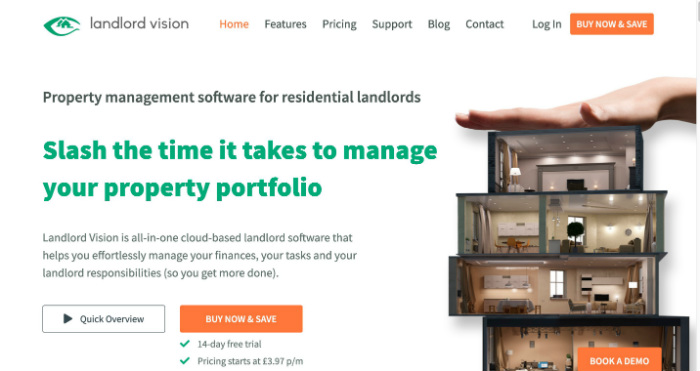The current nationwide lockdown due to COVID-19 is causing issues all across the country, not least for landlords. We caught up with Amer Siddiq, CEO of Landlord Vision to get his views.
Q1: We are right in the middle of a nationwide lockdown, what do you see as the short, medium and long-term impacts of COVID-19 for landlords?
The pandemic has taken us all by surprise, in the short term it’s immediately clear that the impacts for landlords are felt mostly in the pocket with a wide range of residential and commercial tenants struggling to get their rent paid.
Those landlords who had voids as the crisis began are going to find it even more difficult to find a tenant.
Beyond the finances there’s a lot of new emergency legislation being passed, landlords are having to keep on top of this too, if it wasn’t already difficult enough!
In the medium term I think we’ll see some interesting movements on property prices, they’ll likely continue to fall or at least not to grow while social distancing measures are in place.
As things start to get back to normal, I think we’ll see many properties come onto the market which will swell supply and push the price down further.
I don’t think this will last as there will be plenty of bargains out there that will be snapped up by savvy investors righting the supply and demand dynamic.
In the longer term the effect will be more existential. As the dust clears, I think we’ll see that a number of landlords have sold up and those remaining will be the ones who were either lucky enough to not be impacted or those who had a solid business plan.
Over the last few years the government have made no secret of the fact that they’d like to phase out the small time landlord and move more into a situation where landlords run their properties like businesses, thus the ever increasing legislative agenda in the PRS. I don’t have a crystal ball by any means, but in the aftermath of this crisis the government may be closer than ever to achieving that goal.
Q2: Do you think the Government has been fair to landlords during the coronavirus crisis, or could they have done more?
We always look at these things via our own frames of reference, but if you zoom out and look at the bigger picture everyone is suffering or sacrificing in some way right now.
I may usually be the last to rush to the defence of the government, but I think they are doing what they can. They have been slow to act on many things, but they are spinning a lot of plates right now.
Luckily, we have the NRLA who have been lobbying the government on the key issues facing landlords, but we certainly don’t have it the worst right now.
Q3: Airbnb seem to be increasingly moving towards long-term lets, what opportunities and threats do you think this poses for traditional landlords?
I don’t think this will represent much in the way of a threat to traditional landlords. While some of the properties on Airbnb can now be rented for up to 12 months it’s still aimed at a specific type of tenant. Many professionals and families looking for rentals want somewhere they can stay long term.
There’s a reason the government are looking into indefinite tenancies and into abolishing Section 21, it’s because most renters want long term security.
Airbnb properties tend to be furnished and come with all the mod cons. The idea being that they are ready to live in from the second you turn the key in the lock. This isn’t what most traditional renters are after.
Long term lets on Airbnb do represent an opportunity for those landlords who have operated in short term lets (or who want to). One of the key challenges of running a short term letting is keeping the property occupied. Longer term lets represent more security for the landlord.
Q4: Are there any upcoming legal or taxation changes for landlords that might sneak under the radar and surprise some people?
Any new legislative changes at the moment have the potential to sneak under the radar, so it is important for landlords to keep their ear to the ground on anything that may be changing.
In June the Tenant Fees Act will apply to all tenancies regardless of when they were formed.
Up until that point it is still possible to charge some fees if they are written into the existing tenancy agreement. With everyone talking about COVID-19 right now I’d be surprised if we get much in the way of a reminder about that one.
One for Welsh landlords to watch out for is the Renting Homes (Wales) Act, this is going to make a lot of changes to housing law and practice.
This was given Royal Assent back in 2016, and there was talk of it being enacted in September this year. As this is going to have a huge impact on landlords and the way they do business it may be pushed back due to the epidemic, but Welsh landlords should be keeping an eye on this one.
Q5: What do you think is the hardest thing for a new landlord to get to grips with?
I think managing finances is one of the hardest things for new landlords to get to grips with. That’s certainly evident in the feedback we get at Landlord Vision. This was the same in my experience too.
When I first started out as a landlord, I found getting my head around taxes and more specifically my tax return was the biggest challenge.
Q6: Tell us a little bit about Landlord Vision and why it was created?
This leads on nicely from the previous question! When I first became a landlord, I found it difficult to get my head around managing my finances as well as trying to legitimately reduce my taxes and keep on top of all my obligations.
It’s hard to stay on top of things like gas safety certificates, property maintenance and forming tenancies, there’s just a lot to remember.
I tried out a few different software solutions, but I didn’t find anything that was a true all in one solution which is what I was after, so I made my own!
I shared my property management software with the world having discovered a passion for making life easier for other landlords. It was called Landlords Property Manager and it was a downloadable desktop software.
It won awards and was (and still is) widely used. Over time it became obvious that landlords needed a more dynamic version of the software, one that was cloud based and could be accessed from any device, and that’s when Landlord Vision was born.
I launched Landlord Vision in 2013 and it’s grown exponentially since then.
The aim of the software is to give landlords an all-in-one platform to manage every element of their property portfolio.
I really wanted to step away from this idea that you have to use three different programmes to manage everything. Or that you can use a free software and then have to buy twelve different bolt-ons to get it to do what you want. It’s one piece of software at a consistent price to manage every element of your property.
Q7: There aren’t actually that many other landlord management software programs around, why do you think that is?
I think the barrier to entry is very high. Landlord Vision really is a labour of love. We have our own in-house team of developers who are incredibly intelligent and react to tax changes quickly. The developers keep on top of the latest developments to make sure the software is always evolving with the most up to date technology.
The thing companies forget when making landlord software is that you aren’t just catering to your buy to let landlord with a handful of properties.
There are a lot of different types of landlords out there and they all have different requirements. The challenge is meeting all these requirements in one piece of easy to use and accessible software.
When we first set up Landlord Vision it took us over a year to get the deposit function right, because it wasn’t just a landlord taking a security deposit for a tenant.
Some landlords want to take the deposit, some landlords use a letting agent, some have local authority tenants who deal with deposits in a different way, others take a zero deposit. When it comes to returning all or part of that deposit things get even more complicated, especially for HMOs.
We’re still growing and improving Landlord Vision and adding new features all the time, it’s taken us over 15 years to create the software we have today.
I think other providers can either only provide a fraction of the features we have which makes it difficult to compete, or they have to spend a really long time and a lot of development resource to create something that can compete.
Q8: What are the best features of Landlord Vision that you know your customers love?
So many! There are three key features customers tell us they love again and again.
One is that its cloud based so it can be used anywhere from any device. It uses the same level of encryption as many banks, so it’s also very secure.
Two is that the income tax report helps you fill in a tax return in less than 5 minutes – no really!
Vying for third place is our newest feature – receipt scanning. We’ve heard a lot of good things about this feature as it scans receipts and then automatically extracts data into expense items.
The early warning feature is also mentioned a lot. Using this you can set automated alerts for things like rent payments and expiring certificates and insurances, but it can also be customised to give you an alert on absolutely any element of your portfolio.
Q9: And what’s coming next? How will you make Landlord Vision even better?
We gather a lot of feedback from our customers, companies tell you that they always listen to and read feedback, but honestly, customer feedback is the heart and soul of Landlord Vision. All the features we develop and work on are voted for by our customers.
We are currently working on two behemoth integrations that have taken a long time to put in place. One is an HMRC integration for Making Tax Digital, we’re just alpha testing this.
Once the integration is finished customers will be able to submit quarterly summary updates of their business income and expenditure from the software. Based on the information provided, they will receive a view of their emerging tax position, helping them to better budget for their tax throughout the year. They will be able to complete a process to finalise their overall tax position at the end of the year as well.
The second is open banking. This is one of our highest ever feature requests. This will allow customers to link Landlord Vision to their bank account feed for automatic bank reconciliation. We’ve needed to become FCA registered to be able to provide this feature, so we’re currently waiting on the FCA’s approval before we can make the integration live.
Q10: Finally, if you could spend one night in any property in the world, where would you go and why?
Being a Muslim, I have a deep connection with the Prophet Muhammad’s (peace be upon him) mosque in Medina, Saudi Arabia. Whilst I have had the honour of visiting several times, it is always a place the heart yearns to visit again and again.

Want your business featured in an upcoming Industry Insight?
Contact us for details (it’s free!).




